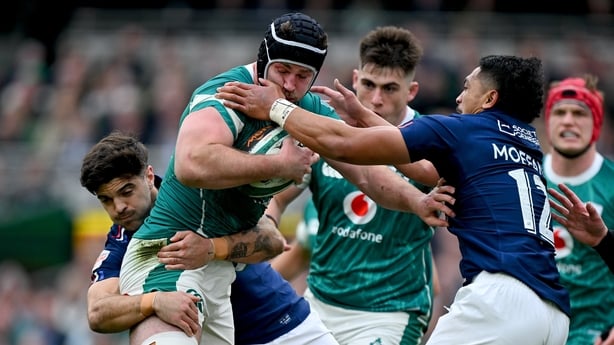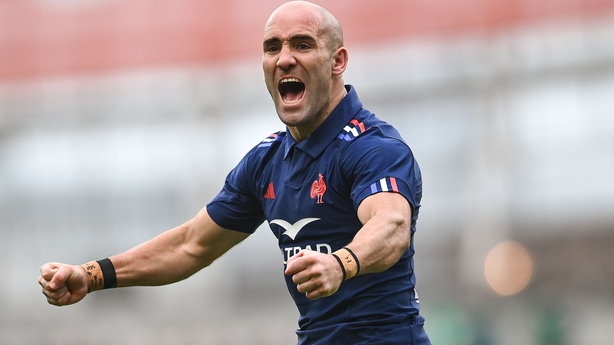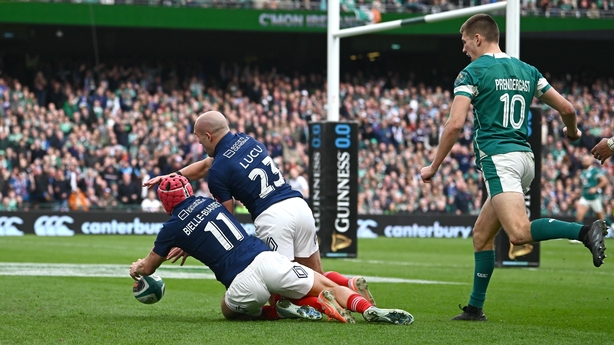Rugby can be a simple game when you reduce it down to the main objective.
The aim of the game is to cross the try line, which Ireland struggled to do, despite enjoying the majority of territory and possession in the opening quarter of Saturday's deflating defeat to France.
The most important factor when playing towards the opposition try line is to go forward. It doesn't matter what gameplan or strategy you use, once it allows you to go forward, the game becomes immeasurably easier.
In fact, teams that have a distinct ability to go forward can probably play the game with many different strategies or gameplans and still be successful.
Sometimes that’s simply down to personnel, their ability to win contacts and maybe even having a mental edge to impact the game at the collision. It’s the old Rassie Erasmus and Jacques Nienaber approach, it’s either you or the player opposite you, a basic one-v-one.
However, there are a multitude of factors dictating whether a team is going forward or not.
Everything starts from the inside and moves out. The set-piece is one of the most important factors when teams are successful. Successful teams have a rock solid set-piece, building confidence every time the game is re-started, and launching more dangerous strike plays because they can attack from wherever they want.
It takes ingenuity and firepower to win a game without a dominant set-piece. It’s not guaranteed to win you a game, but not having one can certainly lose you the game, and being inefficient at the set-piece can make the whole game more difficult.

From a dominant set-piece, you can dictate which space you attack in. Attack spaces can allow teams to present as very physically dominant, but the reality is they can win cleaner ball and faster possession because their players can attack weaker shoulders and ensure the defence struggles to make dominant tackles.
If the opposition struggle to make dominant tackles, then the likelihood is that the next ruck will also be quick and the defence struggles to get set.
In reality, France ensured that Ireland didn’t make many dominant tackles. Once they weathered the Irish storm in the opening quarter, they went about their business as only the French can.
It was more obvious in the second half, particularly as France came from behind to control the rest of the game after Paul Boudehent’s try.
They offloaded out of contact, with nothing scything through the defence, but more so small pop passes to keep the ball alive and move the Irish defence.
On the other side, while Ireland didn’t have any real issues with their set-piece delivery, they struggled to break down the French defence.
In the opening quarter, they ran the French ragged, as Fabien Galthie’s players sought to get a foothold in the game.
However, Ireland failed to make an impact on the scoreboard, despite crossing the line. Caelan Doris was held up in a double tackle, something we wouldn’t expect from him with his footwork ability in contact. It led to greater tension and uncertainty in the Irish attack when they failed to score what would have been a well-deserved try.
France survived, clawed their way back up the pitch in a kick-battle and when Osborne failed to make touch, the visitors took control of the game with a wide counter-attack. This led to the Joe McCarthy yellow card, followed by a French try down the short side of a well-worked maul. They simply attacked into space to cause enough panic in Ireland’s defence and pounced on the mistake.
While France did well to move the contact, they won the physicality battle too. Being clever at set-piece and attacking into space can win the gain-line battle, but so too can sheer physicality.
France had a number of dominant tackles, a couple of which were on Ireland’s playmaker Sam Prendergast. This stopped the Irish attack in its tracks and made the game much more difficult.

In attack, France introduced Emmanuel Meafou in the second half, a great example of blunt physicality making a huge difference in the game.
With Ireland struggling to attack with any flow, they kicked often, and sometimes aimlessly.
There was a set-piece reverse play that aimed to set up a kick in behind the lineout into the French 22.
Dupont sauntered back and caught the ball at his ease. It was wayward stuff from Ireland.
Prendergast had a couple of diagonal grubber kicks from set-pieces too. They weren’t poor decisions, but France managed that part of the game well.
Ireland began to get knocked back at the tackle line and you couldn’t say they won either the kicking game or the transition.
From there, the air came out of the Irish gameplan. A second yellow card was never going to help their cause against a French side that was buzzing for any transition attack, despite the awful injury to their talisman, Dupont.
Maxime Lucu showed the depth that France have at half-back. He kicked unbelievably well, ensuring Ireland had to re-start in their own half a number of times.
When Tomas Ramos played a grubber out of his 22, France demonstrated their physicality in a counter ruck, and then their flair through a Damien Penaud counter attack. Louis Bielle-Biarrey went the long way around Prendergast to finish off what was a soul destroying try for Simon Easterby's side.
Sometimes, certain personnel can change a game. Ireland lost James Lowe in the warm up. He’s the kind of player that could have impressed his qualities on that game.

He often has, breaking up the defensive line with his attacking physicality. It would have taken just one moment in the opening quarter for Ireland to take the lead.
With the poor French discipline and Ireland’s dominance, an early try might have been the filip Ireland needed while the ref was on the French case. But once France got out of trouble, and subsequently onto the scoreboard, they had weathered the Irish storm and unleashed their full box of tricks to dominate the game in Dublin.
So it’s back to the drawing board for Easterby. It often feels like that after a loss.
It doesn’t mean everything Ireland did up to this point is wrong, but once there’s a loss of that magnitude, everything gets questioned and everyone wants to find the answers.
However, Ireland can’t panic at this stage. I’m sure there will be some tweaks to their approach and a few selection calls as they head to Rome.
At moments like this, it’s important that everyone puts their shoulder to the wheel and investigates their own performance, instead of looking for too many solutions.
Had Ireland crossed the line early in the game, had they not given up two yellow cards in two small moments of play, had they dominated more tackles after scoring their maul try to go ahead, the game could have taken on a very different complexion.
It’s hugely frustrating, and a chance of history has been taken away from the team.
While panic isn’t the answer, I’m looking forward to seeing which changes Easterby will make for the final salvo in Rome.
Watch Italy v Ireland in the Six Nations on Saturday from 1.15pm on RTÉ2 and RTÉ Player. Follow a live blog on rte.ie/sport and the RTÉ News app. Listen to live commentary with Saturday Sport on RTÉ Radio 1


